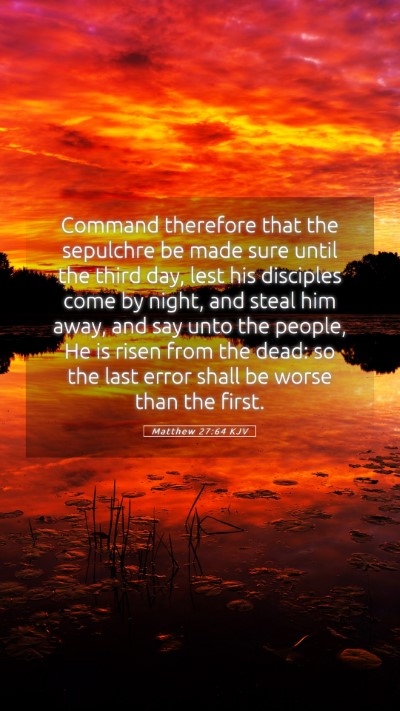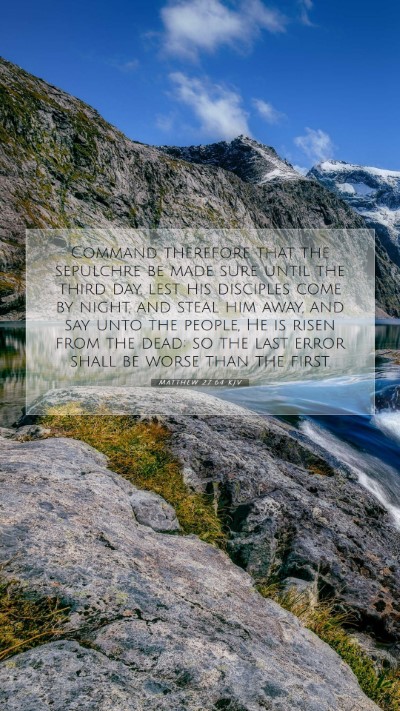Bible Verse Meaning for Matthew 27:64
Verse: "Therefore command that the tomb be made secure until the third day, lest His disciples come by night and steal Him away, and say to the people, 'He has risen from the dead.' So the last deception will be worse than the first." (Matthew 27:64 NKJV)
The context of Matthew 27:64 revolves around the chief priests and Pharisees who approached Pilate requesting that the tomb of Jesus be secured. They feared that the disciples might claim that Jesus had risen from the dead, which would amplify the perceived threat of Jesus' teachings and influence.
Summary of Insights
This verse provides important insights into the events surrounding Jesus' burial and the concerns of the religious authorities of the day. The fear of Jesus' resurrection demonstrates the impact of His ministry and the desperate measures the leaders were willing to take to maintain their authority.
Commentary Insights
-
Matthew Henry's Commentary:
Henry emphasizes the irony in the Jewish leaders' actions. They went to great lengths to guard the tomb, showcasing their acknowledgment of Jesus' power over death, even as they sought to deny it. Their effort to prevent the resurrection proclaimed their deep-seated fear and acknowledgment of Jesus' potential influence on the populace.
-
Albert Barnes' Notes:
Barnes interprets this command as an acknowledgment by the religious leaders that the resurrection of Jesus might inspire greater belief and encourage His followers. The fear of a 'last deception' suggests they were aware that the message of resurrection could significantly sway public opinion and faith.
-
Adam Clarke's Commentary:
Clarke notes that the religious leaders’ request speaks volumes about their perception of Jesus' influence. By seeking to prevent a potential resurrection claim, they inadvertently highlight Jesus' prominence in the minds of the people. This concern reflects on their lack of conviction and understanding of the truth they professed to uphold.
Understanding the Significance
The command to secure the tomb underscores the spiritual battle between belief and unbelief, illustrating the lengths to which authorities will go to protect their interests against what they cannot control. This fear of a manufactured resurrection poses questions about the nature of faith and the underlying truth of Jesus' mission.
Key Themes of Bible Verse Interpretations
- Proclamation of Jesus' Power: The attempt to guard the tomb inadvertently admits Jesus' divine power and potential resurrection.
- Control of the Narrative: The leaders sought to control the narrative surrounding Jesus to prevent the spread of belief in His resurrection.
- Fear of the Followers: The apprehension revealed by the authorities indicates a recognition of the disciples’ loyalty and the growing influence of their teachings.
Cross References
- Matthew 28:11-15: The report of the guards and the fabricated story of the disciples stealing the body.
- John 20:9: The disciples did not understand that He must rise again from the dead.
- Acts 2:23-24: Peter's preaching on the resurrection highlights the fulfillment of God's plan despite human intentions.
Application to Daily Life
Matthew 27:64 serves as a reminder of the importance of faith in the face of challenges. As believers, understanding the lengths to which some may go to deny truth can reinforce our conviction in the resurrection and the transformative power of Christ in our lives.
Conclusion
This verse encapsulates a pivotal moment in the Passion narrative, emphasizing the tension between truth and fear. It invites readers to explore deeper interpretations, fueling Bible study discussions on faith, history, and the implications of Jesus' resurrection.


